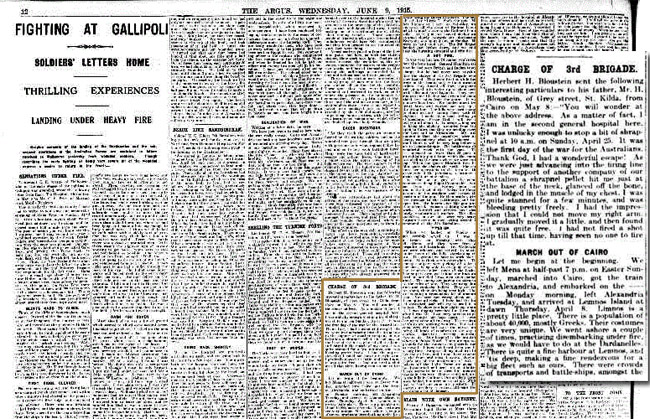Victorian Association of Jewish Ex & Servicemen & Women Australia Incorporated
Founding Member General Sir John Monash GCMG KCB VD
Full Members' Stories
Laugh and cry at the antics, tragedies or funny side of service life. Read about the experiences of some of our members and the one who joined just before his 100th birthday, proving that you are never too old to become a member of VAJEX Australia. If you are an ex-service member and would like your piece and photo included, contact the webmaster.
Blashki Dynasty Full Story
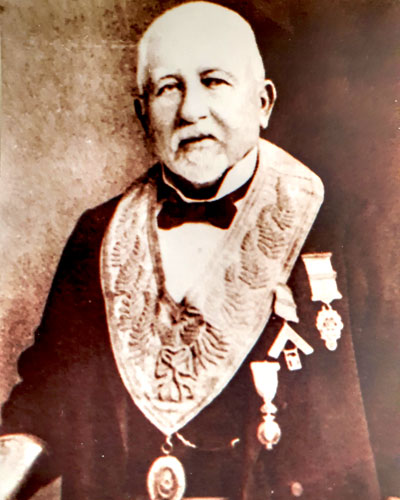 Blashki Dynasty founder in Australia
Blashki Dynasty founder in Australia
by Nerrida Blashki Pohl
One long weekend in the 60’s, I accompanied my father, the late Arnold Roy Blashki (1918-1998), on a drive to Puckapunyal, an army training facility near Seymour in Central Victoria. As a lawyer, often working from Victoria Barracks on St Kilda Rosd, Captain Blashki was working on a Court Martial for a soldier who had gone AWOL (absent without leave). On that outing he explained a little of the continuing Blashki commitment to service in the defence of Australia. That weekend I understood that ‘defence’ did not only mean armed combat.
Shortly before he passed away, I helped my father arrange for a replacement of his Chairmanship of the Victorian State Advisory Council of The Australian Veterans and Defence Services Council “AVADSC” that was under the Patronage of the Rt Hon Sir Ninian Stephen. That body represented about 120,000 war veterans and their common concern was the erosion of Veteran Affairs benefits.
Arnold was the voluntary President of the Australian Legion of Ex-servicemen and Women for some 40 years, President at both State and Federal level. He was also a VAJEX President for two years. He received an MBE in 1970 for that commitment combined with his 18 years on the Jewish Board of Deputies (the state advisory board) and in 1979 was awarded La Croix du Combattant de l’Europe by the European community for his service to war veterans and their settlement in Australia.
Stories of Australian Jewish enlistment have been published, most recently Dapin: Jewish ANZACS. Publications online and on paper do not really reflect the full extent of a soldier’s service. In Dapin's book, my father is listed as a Lieutenant, as he did not become a Captain until re-enlisting after WW11. Likewise, his brother the late Captain Philip Blashki, who left his young family in Sydney to serve an extra nine years of defence in Darwin on re-enlisting after WW11, is recorded as a Private in Jewish records of wartime service.
I am working on a comprehensive story of Blashki service in Australia. The story includes spouses. Growing up in Geelong, where the Blashki’s were good friends with the family of young ‘Jack’, later Sir John Monash, four of my great aunts had dalliances with ‘Jack’. Their older brother Myer Blashki (later known as artist Miles Evergood) joined the Colonial Militia under Monash’s influence. There is a chapter in John Monash, A Biography by Geoffrey Searle titled ‘The Blashki Sisters’. Their private correspondence to Jack is on file at the National Library in Canberra. To my delight I read in that library how my grandfather, Gad Louis Blashki (Lou) accompanied one of his seven sisters as chaperon for a secret tryst with Jack. What is history and what is ‘family business’?
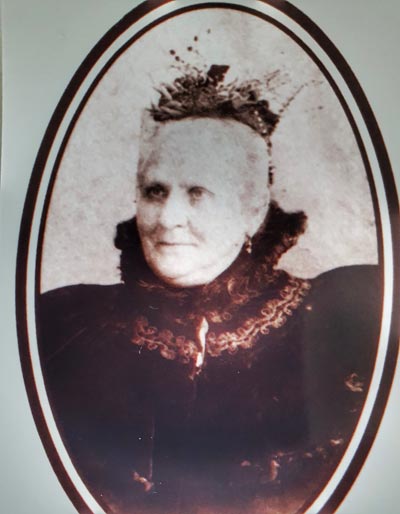 When Phillip and Hannah Blashki first set foot on Australian soil in Melbourne on April Fool’s day 1857, having being fooled into paying first class passage from Liverpool to America but arriving penniless and in steerage class at Station Pier, they had fled Czarist Poland where conscription for Phillip (Favel Wagczewski at the time) would have been unavoidable.
When Phillip and Hannah Blashki first set foot on Australian soil in Melbourne on April Fool’s day 1857, having being fooled into paying first class passage from Liverpool to America but arriving penniless and in steerage class at Station Pier, they had fled Czarist Poland where conscription for Phillip (Favel Wagczewski at the time) would have been unavoidable.
The values inculcated by Phillip and Hannah and passed down to their seven sons and seven daughters, their 55 grandchildren and so forth, have always been in strong defence of a free and democratic Australia. Originally a self-employed hawker in the goldfields, Phillip’s death merited a double front page spread in The Herald, October 31, 2016, ‘Justice for 39 Years’. He was first Chairman of Melbourne’s new City Court Bench in Russell Street. References are on Wikipedia.
Family connections are not easy to identify in military histories. When training as a guide at the Shrine of Remembrance I took visitors to the ambulatory where, set out on parchment in beautiful copperplate, are the names of those who served abroad from Victoria in WW1. Three of my father’s first cousins are inscribed there. Bertie, son of their first-born identical twin, Lazarus Blashki, was a gunner serving in France with the 1st AIF. Hyman Horace Fryberg, son of Jeanette Blashki, survived Gallipoli then had a crisis of faith and identity and died as Methodist Chaplain Major Alan Harvey- Brooks of the US Airforce. I unlocked his adventures for publication in the Journal of the Jewish Historical Society. Dentist Paul Pincus, son of Eva Blashki, of the Australian Flying Corps also served in WW11 as a Major in the British Army Dental Corp.
Two Blashki daughters married two Slutzkin brothers. The ladies’ lingerie business, an institution in the humming fashion precinct of Flinders Lane for decades, kept cousins employed. Rose (Blashki) and Lazar Slutzkin were amongst the 12,000 Palestinian Jews who were rounded up by the Ottomans in 1914 and banished to Alexandria in Egypt. There they met and hosted members of the ANZAC forces about to embark for Gallipoli. Their house was appropriated by the Turkish Army for military use. After the ANZAC Lighthorse Brigade entered Rechovot on 16 November 1916 their home became the headquarters of Australian Lieutenant General Harry Chauvel. When returning to Australia, Lazar handed over the house keys to Chauvel with his blessing.
A Roll of Honour was published by cousin Gael Hammer in Phillip Blashki, A Victorian Patriarch, in 1984. It does not include descendants serving since then, such as our esteemed VAJEX Patron-in-Chief, MAJGEN Jeffrey Rosenfeld. (Jeffrey is a descendant of Minnie Blashki and Albert Behrend – a cousin of John Monash.) I have omitted from Hammer’s list those descendants of the Australian Blashki’s who served in the US, British and Israeli Defence Forces for the purposes of this article.
Died in Action serving Australia:
CAPT Roy Hector Blashki, 4th Brigade, Killed in France 3 August 1917. Buried Vlamertingh New Cemetery, Belgium.
Warrant Officer Victor Samuel Blashki, captured in Singapore and died at the hands of the Japanese on the Burma Road, 26 November 1943. Buried Kanchanaburi War Cemetery (River Kwai) Thailand.
Flying Officer John Davis Pincus, RAF 602 Squadron. Killed over France, 19 July 1944. Buried Ranville war Cemetery France.
Colonial Militia: Myer Blashki (Miles Evergood)
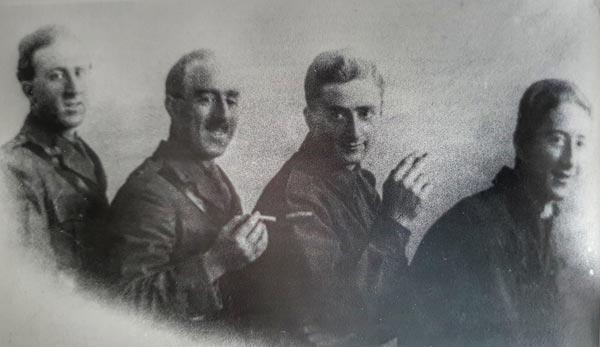 First AIF: Julian Behrend, Oscar Behrend, Bertie Henry Rich Blashki, Ernest Levi Blashki, Eric Phillip Blashki, Hyman Albert Blashki, Myer Blashki (Miles Evergood), Horace Hyman Fryberg, Cecil Pincus, Fabian Pincus, Paul Pincus.
First AIF: Julian Behrend, Oscar Behrend, Bertie Henry Rich Blashki, Ernest Levi Blashki, Eric Phillip Blashki, Hyman Albert Blashki, Myer Blashki (Miles Evergood), Horace Hyman Fryberg, Cecil Pincus, Fabian Pincus, Paul Pincus.
Cecil, Paul, Fabian and Hans
Dr Cecil - dentist First AIF
Dr Paul - dentist Aust Flying Corps First AIF. Major British Army Dental Corps WWII. His plane crashed.
Dr Fabian - gassed on Gallipoli
Dr Hans - Second AIF Transport Division
Second AIF: Albert Edward Robert Blashki, Arnold Roy Blashki, Ernest Alfred Julian Blashki, Kenneth Blashki, Loris Phillip Blashki, Donald Blatchley, Keith Samuel Phillip Blashki, Noel Leon Robert Fryberg, Edward Goodman, Hans Ivo Pincus, Paul Pincus, Dennis Solomon Pizer, Henry Ian Pizer, Allan Slutzkin, George Quentin Slutzkin, Ivon Myer Slutzkin (Sage), Leo Philip Slutzkin, Robert Eliot Slutzkin.
CAPT Arnold Roy Blashki Full Story
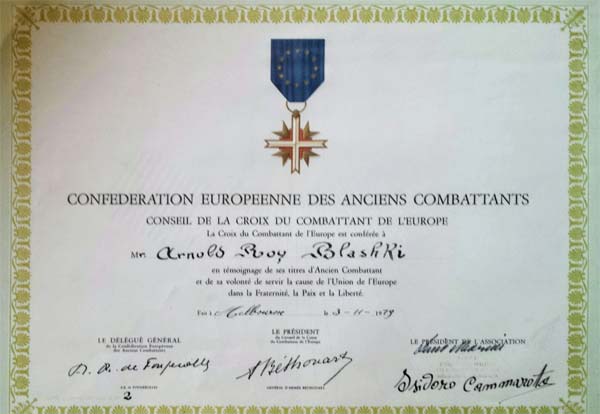 CAPT Arnold Roy Blashki (1918-1998) BA, LLB, MBE, European Cross
CAPT Arnold Roy Blashki (1918-1998) BA, LLB, MBE, European Cross
On 11th July 1945 Arnold Roy Blashki wrote on Southern Command Australian Military Forces letterhead a poem, The Flame, in iambic pentameter. Such was life as a uniformed Law/Arts student during WWII. Until his death at the age of 80, he remained an active campaigner for ex-service veterans.
On top of his lifetime commitment to the affairs of war veterans, Arnold was an active Freemason and in the Grand Team, a past-President of Mount Scopus College Parents Association and the Secretary of the Jewish Board of Deputies (Vic) for a record 18 years. He stood for election in the electorate of St Kilda and like many ‘tall poppies’ was brought down by journalists.
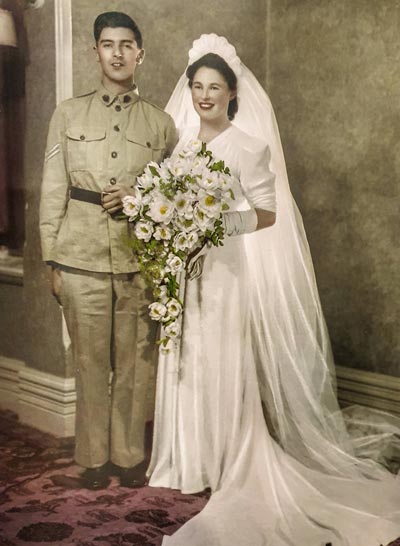 A recipient of numerous honours, Blashki was most proud of his MBE and the European Cross, awarded by the European community for his service to war veterans and their settlement in Australia. In 1979, VAJEX Parade magazine announced he had received their Medal of Merit. Blashki was elected President of the Australian Legion of Ex-servicemen and Women for some 40 Years. It was a voluntary passion, taking him around the country making friends and offering pro-bono legal advice to needy veterans. He was a President at both State and Federal level. He was also a VAJEX President for two years. He received an MBE in 1970 for his commitment to the Legion combined with a record 18 years as secretary of the Jewish Board of Deputies.
A recipient of numerous honours, Blashki was most proud of his MBE and the European Cross, awarded by the European community for his service to war veterans and their settlement in Australia. In 1979, VAJEX Parade magazine announced he had received their Medal of Merit. Blashki was elected President of the Australian Legion of Ex-servicemen and Women for some 40 Years. It was a voluntary passion, taking him around the country making friends and offering pro-bono legal advice to needy veterans. He was a President at both State and Federal level. He was also a VAJEX President for two years. He received an MBE in 1970 for his commitment to the Legion combined with a record 18 years as secretary of the Jewish Board of Deputies.
The WWII wedding of Eugenia (Una) Taft and Arnold Roy Blashki took place at St Kilda Hebrew Congregation and was followed by a huge family reception at Tudor Court. Una was also a student at the University of Melbourne, a pianist in the Conservatorium of Music. The Jewish Chronicle described it as a wedding between two of Australia’s biggest Jewish families. Notable guests who met at this wedding for the first time included Una’s cousin, Anna Wittner, and Arnold’s law-student colleague, Zelman Cowen, in his navy uniform. This instant attraction led to Zelman becoming one of Australia’s most loved and respected Governor Generals.
The marriage gave birth to Nerrida Blashki Pohl, Sharman Lichtenstein, Adrian Blashki and eight grandchildren.
Nerrida remembers, “One long weekend in the 60’s, I accompanied my father on a drive to Puckapunyal. As a lawyer, often working from Victoria Barracks on St Kilda Rd, dad was preparing a Court Martial for a soldier who had gone AWOL. That weekend I understood that ‘defence’ did not only mean armed combat and that he would be committed to service forever.”
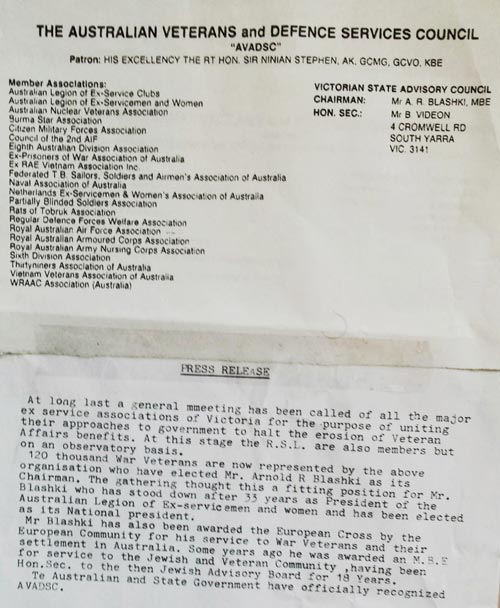 Shortly before he passed away, I helped him arrange for a replacement of his Chairmanship of the Victorian State Advisory Council of The Australian Veterans and Defence Services Council “AVADSC” that was under the Patronage of the Rt Hon Sir Ninian Stephen, 20th Governor General of Australia. AVADSC represented about 120,000 war veterans and their common concern was the erosion of Veteran Affairs benefits.
Shortly before he passed away, I helped him arrange for a replacement of his Chairmanship of the Victorian State Advisory Council of The Australian Veterans and Defence Services Council “AVADSC” that was under the Patronage of the Rt Hon Sir Ninian Stephen, 20th Governor General of Australia. AVADSC represented about 120,000 war veterans and their common concern was the erosion of Veteran Affairs benefits.
I can recall listening, snuggly in bed, to the noisy establishment of new Legion Branches being formalised in boozy, smoky meetings in our Caulfield family home in the 50s. In the 1951 Legion magazine dad writes of the conundrum of Japanese rearmament, and later he writes of VP Day commemorations and Legion fears of communism, ‘Reds Under the Bed’. As newspapers come online I know my late father as an ex-serviceman better."
By 1979 the Legion Journal describes a more refined Presidents Reception ‘where the leaders of all ex-service associations, together with their wives, gathered at the Toorak home of our President, Mr Arnold Blashki, to welcome and congratulate the Ruxtons on Bruce’s succession as State President of the Returned Services League’. For Arnold Blashki of the Legion and Bruce Ruxton of the RSL this was a long hoped for reconciliation between all ex-service organisations and a hoped-for genesis of a Victorian Ex-service Council. AVADSC was eventually absorbed into the RSL.
Woolfe 'Gunner' Lewis Full Story
Woolfe 'Gunner' Lewis
WX25296
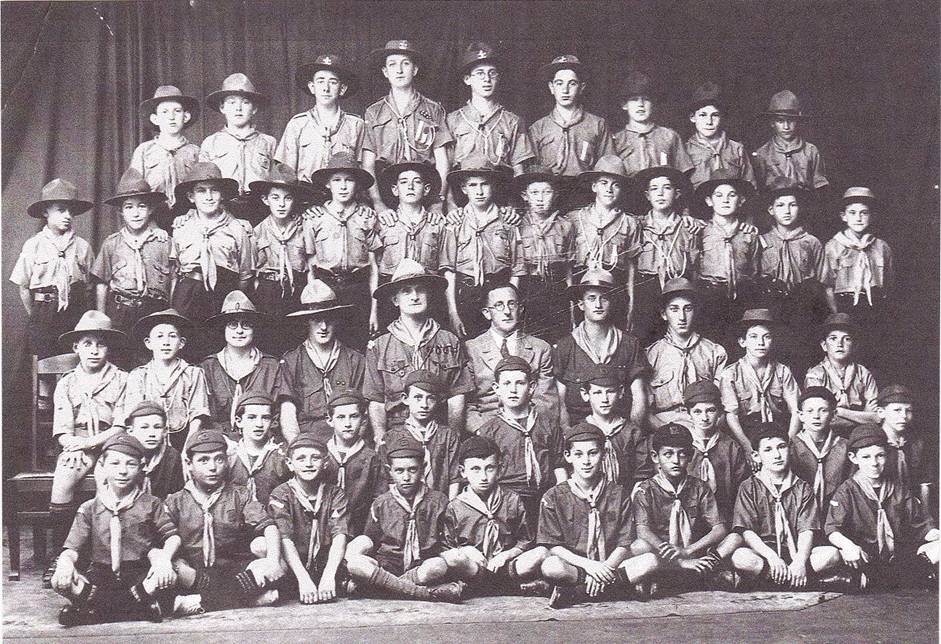 Visiting Woolfe 'Gunner' Lewis, aged 100, was a precious moment, and 'Gunner' came well prepared. He is popular as a guest speaker, recites The Ode on Commemorative occasions, exudes warmth, wit and energy and has a lively memory of the days of WWII.
Visiting Woolfe 'Gunner' Lewis, aged 100, was a precious moment, and 'Gunner' came well prepared. He is popular as a guest speaker, recites The Ode on Commemorative occasions, exudes warmth, wit and energy and has a lively memory of the days of WWII.
'Gunner' shared a 1931 photo of the West Australian 56th Sir John Monash Boys Scout Troop. He was called 'Gunner' as a Scout because a 'Lewis' light machine-gun was widely used in WWI. He spoke of his late wife Muriel Forbes and their four sons, 14 grandchildren and 28 great grandchildren that he is so proud of. He was called 'Gunner' before voluntarily enlisting as WX25296.
There were many from the Scout Group who served Australia in WWII:
| Harry Faigen (Perth) | WX40978 | Army | b. 22 Feb 1922 |
| Issy Holzman (Perth) | W23061 | Army | b. 4 Apr 1922 |
| Sol Krasnostein (Perth) | WX25433 | Army | b. 9 May 1922 |
| Harry Lamden (Perth) | RAN | b. 1921 | |
| Woolfe Lewis (Melb) | WX25296 | Army | b. 6 Dec 1921 |
| Saul Same OAM (Melb) | 17313 | RAAF | b. 5 Jul 1918 |
| Alan Sharp (Sydney) | VX139869 | Army | b. 14 Feb 1923 |
| Matty Steinberg (Perth) | F2705/19 | RAN | b. 14 Dec 1919 |
He remembers vividly the day he Attested for WWII. He went to hear presentations from the land, sea and air forces, instinctively choosing artillery in part, he says, because of his nickname. Aged 19, his leadership skills were noted, being promoted to Sergeant. The next day he received his kit and uniform.
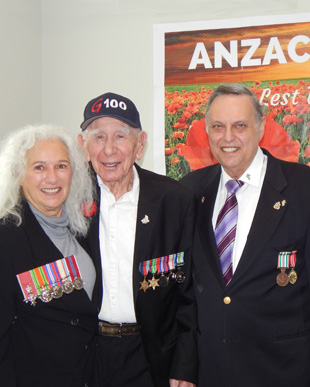 In the 3rd Field Regiment, 7th Division artillery, the first Armoured Division of the West Coast, he went to 'bomb' school, then joined the strength against the Japanese, who were bombing Darwin. He witnessed the Battle of Moratoi in 1944 and the pushback to Sandakan in Borneo, a notorious POW (Prisoner of War) camp. To lighten the tension the men played two-up, but he says he disapproved.
In the 3rd Field Regiment, 7th Division artillery, the first Armoured Division of the West Coast, he went to 'bomb' school, then joined the strength against the Japanese, who were bombing Darwin. He witnessed the Battle of Moratoi in 1944 and the pushback to Sandakan in Borneo, a notorious POW (Prisoner of War) camp. To lighten the tension the men played two-up, but he says he disapproved.
Well into training as a cabinetmaker before the war, a job he detested, his fortune changed when he met his future wife in Melbourne at the AJAX (Maccabi) interstate sports carnival. His career became selling shmattes in all the markets.
The most emotional part of our interview was Gunner remembering his mother putting his tallit, from his barmitzvah, in his kit before he farewelled them. They did not know if they would see him again. He still cherishes and uses that tallit today.
Did his experience in the military affect his life? No, he replies, "What you are at 8 you are at 80, and Every Day is ANZAC Day."
President's Note:
'Gunner' has the typical ANZAC Spirit of looking out for his mates.
In lieu of gifts for his 100th birthday, 'Gunner' requested donations be made to VAJEX Australia. His family and friends contributed a massive sum to the association.
We warmly thank 'Gunner' for this generous gesture and his family and friends for the financial support!
Albert Abromwich Full Story
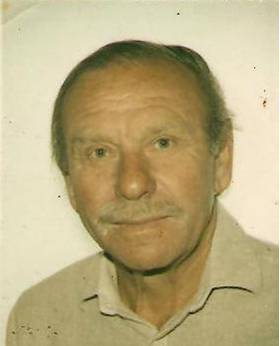 Sergeant Albert (Bill) Abromwich
Sergeant Albert (Bill) Abromwich
55774 RAAF
While reading the Obituary of our late member Air Commodore Phil Opas OBE QC, Bill Abromwich, a sprightly ‘youngster’ of 88, had a clear memory from 1942 rekindled. The group of 200 RAAF men, including Bill, standing on parade in Townsville, Qld, were addressed by a young Flight Lieutenant Phillip Opas, who was at that time Embarkation Officer. Flanked by two hefty airmen he bellowed: “You are a rotten bunch of ‘so-and-sos’.You pinched my revolver and you are all under arrest!”
“Townsville was a staging point for departing to the islands and was a real ‘wild west’ town full of Aussies and Yanks,” recalls Bill. And, it must be said, “more dangerous than a combat zone. Finally we got rounded up to board the RAAF ship “WINETKA” which was loaded with bombs and other stuff.”
Many years after the war, Bill met up with Phillip Opas and recalled that ‘incident’ in 1942. Phillip’s reply was “Correct.”
Horne Island, situated at the top of Australia, was a hellish place, and everyone there walked around showing the evidence of having been bitten by some of the scores of mosquitos.
“During my stay on Horne Island I ferried supplies from island to island, servicing aircraft and was a jack-of-all-trades” says Bill. “There was no way of getting off that island unless you were dead. I was also part of a crew of 400 on a ship for five weeks which ferried petrol in drums and bombs to Milne Bay.” Bill continues, “after 14 months on the island, I got friendly with the Adjutant. There was an opening to re-muster for PTI – Physical Training Instructor – which suited me as I was interested in sports. Sent to Point Cook in Victoria, I became a PTI and then to Somers for nearly six months; followed by pre-flight training. There were two postings: to Warburton Rehabilitation Centre and RAAF Base, Richmond, NSW.I chose the latter which meant I was to undergo a complete parachute course in six weeks. I made seven jumps towards the end of the war. The intended part of my duties – not just to train commandoes and Z Force personnel and saboteurs to drop behind enemy lines, but also doctors who were dropped into POW camps to give medical aid to the prisoners of the Japanese.”
“As well as RAAF Richmond, we conducted training near Cairns, Qld. As far as my memory serves me, no other Jewish serviceman was involved in the same work as me, for which I was suitable because of my background as a Phys Ed teacher for nearly 40 years, training AJAX-MACCABI, and running classes for children as well as businessmen.”
Bill concludes his story by admitting that his mental and physical well-being is due to his lifelong interest in keeping fit and helping others to achieve this.
POSTSCRIPT. Bill was in Sydney waiting for a train when a siren sounded. It was the day a Japanese submarine came into Sydney Harbour.
Joseph Hayat Full Story
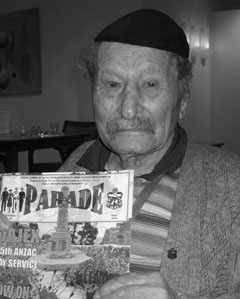 Sadly Joseph passed away peacefully surrounded by his family.
Sadly Joseph passed away peacefully surrounded by his family.
To view his page in the Books of Remembrance. Insert Link
New Member Welcomed
Mr Joseph Hayat
(V395188)
Joseph seen wearing his new VAJEX membership badge
and holding the new first edition PARADE magazine in colour.
The President of VAJEX, Mr Ben Hirsh, with some Committee Members (Vice President, Judy Landau; Welfare Officer, Eric Gordon; Media Liaison Officer, Harold Kaprin; and Lousie Dyskin), made a special visit to personally welcome a new VAJEX member. This highly unusal event was prompted by the unique age of this Australian Army veteran. With his 100th birthday on the horizon in February 2011, a kosher cake still hot from the oven was brought for him to enjoy.
Joseph was nearly 31 years old when he enlisted on 28th June 1942 and was posted to 16 Bn Volunteer Defence Corps for part time duty. At the time, he was an orchardist in Shepparton and married for 10 years to Hilda.
Stephen Hirsh Full Story
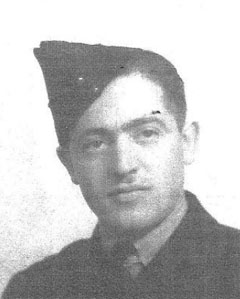 Stephen Hirsh, NX139053 (N26436)
Stephen Hirsh, NX139053 (N26436)
My Memories Of War And Peace
Stephen Hirsh was born in July, 1921 in Lodz, Poland and immigrated to Australia with his family in 1927. Settling in Melbourne with him were his parents, the late Morris and Gitl Hirsh, his two brothers, Philip* and Jack, and his sister Rose (Boltin). Stephen left school at the age of 14 to work in a ladies clothing factory. He was particularly interested in art, and left for Sydney to find work. When war came, he joined the AIF, and was soon stationed in Darwin as part of a protection force against a feared imminent invasion by the Japanese.
I was privileged to read Stephen’s ‘scrap book’ and his letters to his sister Rose written during the war years, in which he recounted his joy at receiving letters from home, and his thoughts of them all being together ‘for Passover’. In one of his letters, he relates an incident. “One night I woke up to feel something crawling on my feet. My first thought was that this is a snake made me feel uneasy. It turned out to be our pet wallaby looking for food. It frightened three years out of my life.”
Of a more serious nature, Stephen recalls: “During one of the bombing raids on Darwin in 1942, on returning from patrol duties, I was approached by a sergeant whose comments were far from friendly. ‘Well, Jew-boy,’ he said, ‘they didn’t get you this time – next time, eh?’ My fellow-Diggers who heard this, advised me to report this to my superiors.”
Stephen continues, “I decided to face this sergeant and asked him why he made that remark. His answer was ‘physical’ and I retaliated by knocking him unconscious. Unknown to me, this fight was witnessed by my Company Officers and the late Chaplain Rabbi L M Goldman. No mention was ever made of this incident and the sergeant in question was transferred, and the Army hushed up the whole affair.”
“I returned to Melbourne for duty until my discharge in 1945, enrolling at Melbourne ‘Tech’ in an art course with noted artist Percy White; as well as in a fashion design course which gave me the training to set up my own fashion business which lasted quite a few years.”
Stephen concludes that, “looking back as a retiree after moving to Sydney, I now live in Rose Bay and my interests are: my daughter, the art world and positive thinking.”
Stephen enlisted in the Army 28th July 1942 and was discharged 11th Sep 1945 as a Private in 11th Supply Depot Company, Australian Army Service Corps. His brothers Philip and Jack also served in the Army:
Philip enlisted 30th Nov 1942 and was discharged 7th Jan 1946 as a Sergeant, Q Aust.
Heavy Battery, Royal Australian Artillery
Jack enlisted 26th Feb 1942 and was discharged 6th Dec 1944 as a Private, 1 Aust
Heavy Anti-Aircraft Training Regiment.
* Philip passed away on 3rd May 2009
Zymmunt (Israel) Mos Full Story
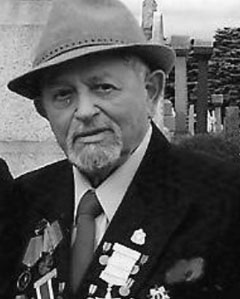 What The 60th Anniversary Of The End Of World War I
What The 60th Anniversary Of The End Of World War I
- I Meant To Me In 2005
by Zygmunt (Israel) Mos
My name is Israel Abram Mosieznicki and I was born on the 17thApril 1923 in the Polish city of Suwalki, which is close to Bialystok. Due to anti-Semitic discrimination, I changed my name to Zygmunt Mos. In December 1939 the Germans occupied Poland. They didn’t allow Jewish people to stay in line for food and my father ignored this rule and was taken away by a German soldier and shot. After two months, all Jews were evacuated and sent by train to concentration camps.
During a brief train stop near a forest on this journey, my friends and I managed to escape through a slightly opened door. I was then 16 years old as were my friends. It was from then on that my struggle for survival commenced.
Whilst hiding out in the forest I joined the Polish resistance. After about six months we met up with the Russian soldiers who informed me that due to my age, I could not join the Russian army. Instead, I had to be educated in a Russian cadet school. I found myself quite fortunate to have this rare opportunity, as not many were privileged to attend a cadet school. The school was in the Russian city of Sverdlovsk. I learned many skills there which enabled me to become a tank commander with the rank of sergeant. In 1943 I completed my studies in the cadet school and joined the Russian army. By that time we were advancing across Russian territory towards the Polish border under the command of Marshal Zukov. We participated in many dangerous battles against the German forces.
By the end of 1943, all Polish-born members of the Russian army were transferred to the newly formed Polish army after its formation in the Ukraine. I was then a sergeant serving in the 4thDivision.
In March 1944 we were advancing towards the town of Lublin in Poland. Some 20 kms from this town, we came across Majdanek concentration camp. Entering this camp, we witnessed some horrendous sights; people lying on the ground, most of them dead. I tried to talk to one of the victims but he didn’t reply. He was so weak that he couldn’t talk. I couldn’t believe my own eyes that such atrocities happened in the world. Most of these prisoners were Jewish but there were many Russians and Gypsies; and many children. The Russian army provided some assistance in the way of nurses, who offered their help. We could not stay there too long as we were under orders to move on. We advanced towards Lublin and, after a two-week break, moved on to Warsaw and Berlin.
It was Christmas 1944 and our Division came to the Wisla (Vistula River) overlooking Warsaw. On the other side of the frozen river were the Germans. Our commander called for two volunteers to cross the river and bring back live German soldiers for the purpose of obtaining information on the strength of their forces and strategies. Due to my knowledge of the German language I volunteered with a friend. We were both dressed in German uniforms and successfully crossed the river bringing back two captured enemy soldiers, one of them a sergeant. The darkness proved to be our best ally and as they Germans were unfamiliar with that territory, added to our success. We took them to our headquarters and obtained a lot of valuable information from them. After this operation, I was awarded two medals for bravery. This was the most difficult and unimaginable experience throughout the entire war.
In January 1945 only the 4th Polish Division managed to cross the Vistula River without much enemy resistance. However, when we crossed the German border, we experienced some heavy fighting but we came through it.
On the 3rd of May 1945 our Formation became the first to reach Berlin. The war was practically over except for some resistance from German snipers. We stayed in Berlin until the 9th of May – the day the Germans surrendered to the Russian Army. This was the happiest day of my life.
Mr Mos is a member of VAJEX, and has attended our Services over the years with many of his comrades-in-arms from the former Soviet Union.
Henry Barclay Full Story
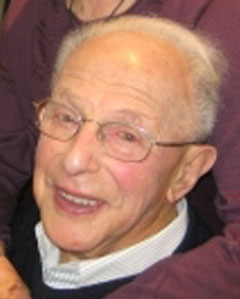 The Varied and Colourful Life of
The Varied and Colourful Life of
Henry Barclay (Z′′L)
There are VAJEX members who can tell intriguing tales about their life and experiences, but very few can top the varied and unusual twists and turns of life compared to Henry Barclay.
His optimistic and positive outlook on life is like a breath of fresh air, and when talking to him, the enthusiasm he radiates is like a strong life force, illuminating the room he sits in.
Born in Lwow, Poland on 11th September 1914 as Henry Burzynka, he grew up in a traditional, secular Jewish home. Finishing his studies in a gymnasium in his home town, he was very aware of anti-Semitism and prejudice through his school years. “Insults and physical threats were part and parcel of my school years, being both short in stature and Jewish, but I was a fast runner, so usually got away before anything too unpleasant happened to me,” Henry says to me with a grin.
As the situation because more unpleasant, he decided that enough was enough, and it was time to leave Poland, and he left in 1935, emigrating to France. “As I did not speak French when I arrived, I set out to learn as quickly as possible.” Enrolling in the Insitut de Chimie in Caen, he graduated with a Diploma in Chemical Engineering in 1939.
After completing his Diploma, he obtained a position managing a sugar factory for a few months, and later volunteered for the French army, but not being a French citizen, finished up in the Foreign Legion. The possible option was to serve in Northern France or Indo-China, but he found himself shipped to Morocco. While his ambition was to drive tanks, in good old army fashion was assigned to the cavalry instead. Assigned a horse, Henry says, “I don’t know who got the bigger fright, the horse or me.”
After serving three years, at the fall of continental France to the Germans, his unit was demobilised and he was assigned to work on the Trans-Sahara Railway where he learnt a new skill using a pneumatic drill to break up rocks. Several months later he was sent back to Vichy France, but as a returned French soldier, his Jewishness did not pose any serious problems.
He obtained a position as an industrial chemist masking beauty products, including hair creams, and even black boot polish that was sold to the German army. As the war progressed and Vichy France came increasingly under Nazi influence, Henry decided it was prudent to move on, and escaped across the Pyrenees to Spain. Caught crossing the border, he was arrested and sent to the Miranda de Ebro Concentration Camp. Never one to take things lying down, he staged a seven day hunger strike protesting against the poor living conditions.
Released in May 1943, he went to Madrid where he learned Spanish and worked in a dry cleaning plant. A few months later he was sent to Portugal, then Gibraltar and a few months later was shipped to England.
Arriving in Scotland, it was suggested that it would be beneficial to change his name to one that would blend in the new environment. This led to his transformation to Henry Barclay. Resuming his military career, he joined the Free Polish Army, but through a series of misadventures, was arrested as a suspect spy. Taken to London for intensive interrogation, his innocence was established and he left the army in October 1943, joining the work force once again in his field as an industrial chemist.
He met his future wife, Charlotte, they married and his son Michael was born in 1945. In his spare time he became involved in the Scouting movement, a connection that would last for many decades.
Another chapter was opened in Henry’s life in 1956 when he decided to pull up stakes and emigrate “Down Under”. On arrival he found a position with Fibre makers in Bayswater, initially as an industrial chemist, and later manager of the nylon plant. In 1975 he retired after 19 years. Not one to sit idly around, he joined a family firm of Roger David as a salesman, also became a Mason joining the Lodge of Tradition.
But his many other activities have kept him fully occupied over the years and brought him many accolades for selfless service.
Back in 1959, he and Harold Nathan formed the 24th Camberwell Scout Group, under the auspices of the Leo Baeck Centre, the first Jewish Scout Group in the Eastern suburbs. One interesting sidelight was the ecumenical spirit at its opening, when Rabbis Jacob Danglow and Herman Sanger jointly officially participated at the formal opening. This was the first time such a ceremony was performed jointly by a Liberal and Orthodox Rabbi.
Henry served as Group Scout Master for 15 years and on retiring was given the singular honour of being presented with a Medal of Merit by the then Victorian Governor, Sir Rohan Delacombe. Adding to his multi-faceted talents, Henry began oil painting as a hobby and joined the Malvern Arts Society. As well as this, he took up the hobby of collecting clocks.
Sadly, in the year of his and Charlotte’s Golden Wedding Anniversary, Charlotte died, leaving Henry devastated. A few years later he met Bella Szmerling and they married in 1994, starting a new and happy chapter of his eventful life.
He took up further education learning new languages and skills, and he now speaks Polish, English, French, Spanish and Hebrew.
Henry is a born optimist and takes life’s hurdles in his stride. His philosophy can be encapsulated by one of his quotes: “Digging the Trans-Sahara Railway, while everyone around me was complaining, I saw it as an experience. I always try to make the most of any situation that I find and make life enjoyable.
A committee member of VAJEX since 1996, Henry is a true inspiration to everyone around him, and at 90 years young, continues to make travelling through life a positive and enjoyable journey.
(This article was written in 2004. Henry passed away 22nd February 2009. May his dear soul rest in peace.)
Herbert Bloustein Full Story
Herbert Bloustein, who was born in Ballarat, enlisted in the Australian Imperial Force on 19th August 1914, aged 21 years. He later served in Europe, where he was awarded the Meritorious Service Medal.
On 25th April 1915, Herbert Bloustein landed on the shores of Gallipoli, Turkey with the 3rd Brigade.
He sent a letter to his father in St Kilda, which was published in The Argus newspaper on 9thJune 1915.
“Charge Of The 3rd Brigade
Herbert H Bloustein sent the following interesting particulars to his father Mr H Bloustein, of Grey Street, St Kilda from Cairo on May 8th:
"You will wonder at the above address. As a matter of fact, I am in the second general hospital here. I was unlucky enough to stop a bit of shrapnel at 10am on Sunday April 25th. It was the first day of the war for the Australians. Thank G-d I had a wonderful escape! As we were just advancing into the firing line to the support of another company of our battalion a shrapnel pellet hit me just at the base of the neck, glanced off the bone and lodged in the muscle of my chest. l was quite stunned for a few minutes and was bleeding pretty freely. I had the impression that I could not move my right arm. I gradually moved it a little and then found it was quite free. I had not fired a shot up till that time having seen no one to fire at.
March Out Of Cairo
Let me begin at the beginning. We left Mena at half past 7pm on Easter Sunday, marched into Cairo, got the train to Alexandria, and embarked on the (ship’s name was censored) on Monday morning, left Alexandria Tuesday and arrived at Lemnos Island at dawn Thursday April 8th. Lemnos is a pretty little place. There is a population of about 40,000mostly Greeks. Their costumes are very unique. We went ashore a couple of times practicing disembarking under fire as we would have to do at the Dardanelles. There is quite a fine harbour at Lemnos and ‘tis deep making a fine rendezvous for a big fleet such as ours. There were crowds of transports and battle ships, amongst the latter being the Queen Elizabeth. The boys all call her “Lizzie”. She’s the pet. We left Lemnos at 2pm on Saturday and anchored off the coast of Embros Island, which is much closer to the Gallipoli Peninsula. At 11pm we heaved anchor and steamed slowly towards our destination. Everyone was up at 3am on Sunday. We were to land at 8am. The 3rd Brigade landed just before dawn and we could hear the bursting shrapnel and rifle fire.
A Hot Fire
It was very hot fire. Of course, you’ve read how the boys fared. General Hamilton said that he had seen British and Indian troops charge, but he had never seen anything like the charge of the 3rd Brigade when they landed. They were fired at while they were in the boats and, without awaiting orders they tossed off their equipment and jumped into water up to their necks with rifles and fixed bayonets. They never stopped once till they had driven the enemy about two miles from the shore. It was a marvellous feat. We landed about two hours later and worked our way up to the firing line. The hills were hard enough to climb without taking them with the bayonet. I could fill a book telling you of incidents. Please G-d, I will live to tell you about it. It seems a long way to bring the slightly wounded from Gallipoli to Cairo, but they are sending everyone here and to Alexandria. My own opinion is that the casualties were not heavy, considering what we achieved. I don’t think it will be very long before we are in Constantinople. The battle-ships did wonderful work with the guns. The (ship’s name was censored) silenced no fewer than 13 guns on an enfilading point from which the enemy was shelling the beach where we were landing. When the Queen Elizabeth fires her 15in guns she shakes the earth. She confines her operations to the forts on the other side of the peninsula, a distance of about eight or nine miles.
As soon as a gun of the enemy commences firing, Flight Commander Samson (who is a Sydney man and is the head of the Naval Air Corps), ascends in his seaplane and locates the position of the gun. He then sends a wireless message to the battleship and they open fire. He hovers over the gun until it is silenced. Samson is doing wonderful work. Aircraft and wireless have absolutely revolutionised warfare. The officer casualties on our side were very heavy. Captain Carter is now acting second-in-command of the 5thBattalion.
When we landed on Sunday, we got terribly mixed up. I was in a trench on Monday with about 40 others, and they were from all brigades and battalions. On Wednesday we were relieved, and retired to muster under cover of the hills overlooking the sea. The ground we have to work over is awful. It is thick scrub everywhere. The enemy’s snipers were picking off a lot of our men, being able to creep up close to the trenches under cover of the bushes. The snipers even got behind our lines and fired on our Red Cross men (non-combatants). The enemy are paying no attention to the rules of war. They are using dum dum and explosive bullets. They are rotten shots, their aim being very high. They are wasting a tremendous lot of ammunition. You need not worry about me, as I am quite all right. I have had the bullet extracted and will try to send it onto you. To show you how slight my wound is, I was digging trenches for three days after I was hit. I am very anxious to get back amongst our boys again. I cursed having to come all this way. The residents of Cairo are working wonders. The ladies come every day and assist the nurses and bring all kinds of comforts in the way of clothes, cigarettes, writing materials, flowers etc. Our hospital is the beautiful Ghezireh Palace Hotel. There are spacious grounds for the convalescent patients such as myself. I have not heard from you for a long time. Suppose all my mail will follow me on here, and I shall have returned to the front and missed it again. Anyhow, that’s one of the misfortunes of war, I believe all the Light Horse are going to be dismounted and sent on as infantry. There seems to be no need for mounted troops in this war. Horses could not work in the hills in Gallipoli. Our artillery horses were landed, but were no use at all. Mules had to haul our guns into position. The enemy’s artillery is rotten, although they are doing a lot of damage.”
Harold Karpin Full Story
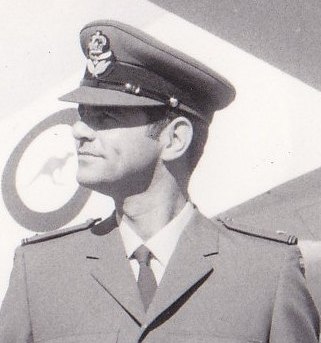 A JEW IN NATIONAL SERVICE
A JEW IN NATIONAL SERVICE
by Squadron Leader Harold Karpin, RAAF (Retd)
Let me tell you about Mannie.
Mannie was older than the rest of our National Service intake by at least seven years, having received a deferment until he had finished his University studies. He was as thin as a rake, with a jaw like Joe Palooka and glasses like Woody Allen. Mannie was an Orthodox Jew complete with a constant heavy stubble and an army beret that became his coppola. Even without his uniform, which always looked two sizes too big for him, or his boots, which were so big that his spindly legs seemed to have trouble dragging them, he stood out from the crowd - any crowd. He was obviously out of place and enjoyed being so.
Being Orthodox, Mannie used to lay tefillin and daven when he arose. On our first morning at Puckapunyal, I remember the sight of Mannie standing on the duck boards beside his bed wearing his tallit and teffilin shockling away to his hearts delight.
One of the boys came up to me and whispered, “What’s he doing?”
I looked at the marquee beside us and saw a man, who later was to become known to me as Patrick, kneeling beside his bed, head bowed with hands posed in supplication.
I pointed at Patrick and said, “Mannie is doing the same as him. He is praying.”
From then on, Mannie’s davening was accepted by all as being “the same sort of thing” as Patrick’s praying. In fact, from then on Mannie became the unelected leader of the Jews in our intake....all seven of us. He was to go on and stubbornly fight many religious battles on our behalf, the first of which was to have kosher food delivered for us on a regular basis, and a table set aside in the Mess Hall for our use.
A little secret.....the normal salads were better than the kosher tinned beef!
“Church Parade! Attention!
Catholics! To your left! Fall out! Quick march!
Church of England! To your right! Fall out! Quick march!
Other Protestant Denominations! To the front! Fall out! Quick march!
Remainder! Stand at Ease!
Attention! Jews! Form up to the rear! About turn! Quick march!
Remainder! Dismissed! Right turn! Quick march!
Right you are! Jews will report for kitchen duties in a half hour! Dismissed!”
Mannie did what looked like a right turn with pike,broke ranks, and shuffled purposefully toward the officer, who was at least three years younger than him. Casually coming to a halt and touching his hat, Mannie asked in his soft University manner, “Why are we Jews being punished for our religion? Kitchen duties are for those who have done wrong! What have we done wrong?Why should we be punished whilst all of the others are marching to church or have been dismissed?”
“Gunner, (the lowest rank in the Artillery) there is nothing else I can do with you lot. Now fall out!”
“Sir, we are not a lot, but seven, and I repeat, what have we done wrong?”
“Gunner, Nothing! What do you suggest I do with you seven?”
“Sir, you had those who had no religion dismissed! Perhaps, that is the answer to our problem.”
“Gunner, Return to your ranks!”
Back dragged Mannie to consider another form of attack if this one failed.
The young officer waited until Mannie had settled in with the rest of us.
“Jews! Dismissed! To your barrack, right turn! Quick march!”
To our barracks we marched. How could we fill in the time until church service was over? Seven was just the right number for a (friendly) game of poker! From then on poker became our church of choice!
“O.K let's go and see him.”
The young officer kept us waiting for what he thought was the required time to have us think he was busy with top security information. When he had finished shuffling his papers into a neat heap, his eyes met Mannie’s witha look of disdainful acceptance. “Do you know that the three of you could be classedas a mutiny? However, what’s on your mind this time?”
“Excuse me Sir, but we have our Passover coming up soon and there are a few things we will need.”
“Oh, yes, it’s your Easter isn’t it?” he said with a look of all knowing satisfaction. “What is it you want?”
“Well Sir, we will need special food and wine for the duration.”
“Oh right, like Lent. No problem.”
“We will need a special space in the kitchen to store the food.”
“No problem.”
“We will need pots and pans in which to cook the food.”
“No problem, see the cooks and just take what you want from the kitchen.”
“No Sir, they will need to be brand new pots and pans that haven’t been used before.”
“OK anything else?”
“A new stove on which to cook the food.”
“Hey. Hey, are you joking?”
“No, Sir, ask our Rabbi.”
“Now wait a minute. How long does your Easter last?”
“Eight days, Sir.”
“I can't give you an immediate answer. Let me think it over and I’ll give you my decision tomorrow.”
Think it over! We knew that the young officer was way out of his depth and that he would have to seek guidance from a higher authority.
The next day, we marched into the young officer’s tent, standing to attention while Mannie did his impression of saluting ... up two three, away.
“Gunner, having giving the matter a lot of thought”, (which in truth meant I have asked someone who has given me the answer to the problem), I suggest that you give me the names of the Jewish soldiers who want to do their Passover and I will arrange to have the orderly room issue you all with an eight day pass. You see, we in the Army don’t want to interfere with your right during National Service to celebrate your religious beliefs. Enjoy your Passover!”
National Service ended not long after we completed our service.
Sometimes I wonder if Mannie and his “lot” had anything to do with it!
Harold Karpin has recently joined VAJEX, and honoured us by reciting Psalm 23 at the 2009 ANZAC Commemoration Service.
Leo Max Full Story
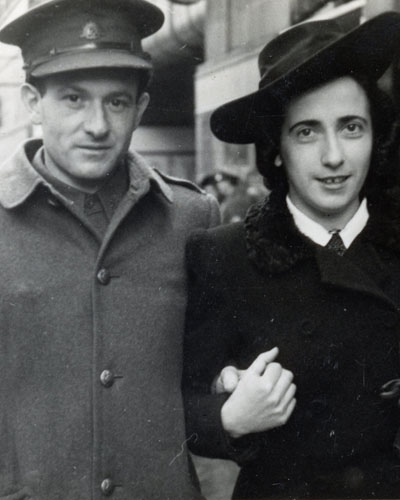 Leo Max – a Dunera Boy (written by his Son Dennis Max)
Leo Max – a Dunera Boy (written by his Son Dennis Max)
The ship HMT Dunera (hired military transport) has been the subject of at least three books and one full length feature film and I do not intend to provide a summarized version of them in this brief article. For specific references I have relied on the excellent work “The Dunera Affair” by Paul Bartrop and Gabrielle Eisen published in 1990. If readers want to learn more they can refer to the abovementioned or a summary entry in Wikepedia.
Leo Max was born in the village of Kobersdorf in southern Austria on 29th October 1910. It was one of seven Jewish communities in Burgenland, Austria, and each had its own synagogue. He was one of seven siblings. After his schooling he went to Vienna to apprentice as a master tailor and lived in an apartment with an aunt in the second district, which had a large Jewish population.
In March 1938 Nazi Germany unified Austria to itself in what is referred to as the Anschluss. Life soon became more difficult for the Jews of Austria. A friend in his apartment building learned that the Jews at their address were to be arrested the following morning, and without any planning they immediately went to the railway station and caught a train in order to escape. They continued to travel by train across Germany with the intention of crossing the border into Belgium.
They left from their rail journey at a station close to the border and proceeded on foot, where they were apprehended by German soldiers and taken back to a guard house. Eventually an officer arrived and asked who they were and where they were going. They admitted that they were Austrian Jews attempting to cross into Belgium. The officer seemed sympathetic and offered to release them at the border that night. At the border they were told to run, and they zig-zagged through the trees fearing they would be used for target practice, but fortunately there was no shooting. They were caught by the Belgian border guards and eventually interned in a refugee camp with other German and Austrian escapees.
After Germany invaded Poland on 1st September 1939 and Britain declared war, the British recognised they had a shortage of various professions key to the war effort an issued requests for plumbers, carpenters, electricians, medical staff and TAILORS. Leo seized the opportunity and volunteered and was transported to England. He worked in a uniform factory in Slough, west of London.
Once the Low Countries were invaded in early 1940 panic emerged in Britain that some of the refugees might be fifth columnists and on 12th May an order was issued to either have Austrians and Germans report to police weekly, or to round up and intern “enemy aliens” between 16 and 60, depending on how they were categorized according to threat level. About 4000 were interned in Kitchener Camp in Kent. The objective was to transport these people to Canada, but after one of the ships – Arandora Star was torpedoed shortly after leaving Liverpool with the loss of many lives, and some survivors. Australia was then asked, and agreed to take up to 6000 refugees. The Dunera left Liverpool on 10th July. 1940 carrying over 2000 refugees. The conditions were appalling and the treatment meted out by the 141 British crew and guards was cruel, and subsequently senior officers were reprimanded and NCO’s were reduced in rank.
The Dunera arrived in Sydney 0n 6th September 1940 and the refugees were transported by train to two internment camps in Hay, NSW. After their arrival relatives and friends of the refugees still in Britain began to lobby the British Government over the status of the deportees and the Prime Minister Winston Churchill regretted the decision to send them away. After the Japanese attack on Pearl Harbour the prisoners were reclassified as friendly aliens and Released by the Australian Government. About 1000 volunteerd to join the Australian Military forces, and most of the rest went back to Britain to serve in their military.
Leo Max volunteered to remain in Australia, and like many of his colleagues joined the 8th Employment Company at Camp Pell, located on Flemington Road North Melbourne, where the Royal Childrens’ Hospital now stands.
He was a Private and worked in the Tailoring Unit, making uniforms for officers. After having located there for several months he realized that there were other Jews living in the immediate vicinity who had migrated to Australia prior to the war commencing. On his weekends he started offering his tailoring services to some of these people.
On one occasion he was conducting a fitting for one such gentleman and he noticed a young woman there was measuring up the man’s wife for a dress. She was originally from Germany and had arrived in Melbourne 2 years earlier and was living in Flemington Road, almost opposite Camp Pell. They started dating. Her name was Anneliese Meyer.
A couple of months later when he arrived to take her out the noticed he had a new chevron on his sleeve. “What is that?” she asked. He replied “Because I am a good tailor they have promoted me to Lance Corporal”. About two months later when he arrived to take her out and he had 2 chevrons. “And what is that?” she asked. He replied “Because I am a Master Tailor they have promoted me to full Corporal”. And about a month later he had 3 chevrons. “What is that?” she asked. “Because I am their best tailor I have been promoted to Sargeant and I am now in charge of all tailoring at Camp Pell.” He answered.
In 1943 Leo married Anneliese at Melbourne Hebrew Congregation.
Leo was de-mobbed at the beginning of 1946. He and Anne (Anneliese) lived at 205 Flemington Road until 1954 when they purchased a house in McKinnon. They had 2 sons – Dennis and Gary and eventually 5 grand children.
)
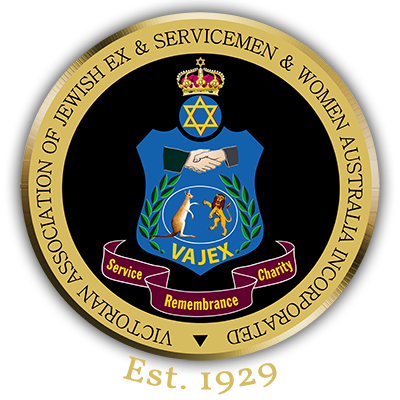
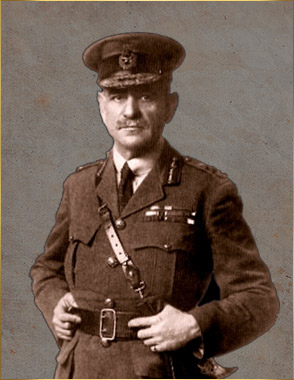 John Monash (Monasch) born
in Melbourne, Australia on 27 June 1865, the son of
German Polish Jewish migrants, can be researched in any
military history encyclopaedia or in fact by just
‘Googling’ his name on the internet. His history
and list of achievements are long and far too many to detail
in this brief summary. However, might I say that reading his
history is well worth the effort and I can assure you that
his deeds will amaze you. I have found that the deeds are
better labelled on more than one man and in more than one
lifetime.
John Monash (Monasch) born
in Melbourne, Australia on 27 June 1865, the son of
German Polish Jewish migrants, can be researched in any
military history encyclopaedia or in fact by just
‘Googling’ his name on the internet. His history
and list of achievements are long and far too many to detail
in this brief summary. However, might I say that reading his
history is well worth the effort and I can assure you that
his deeds will amaze you. I have found that the deeds are
better labelled on more than one man and in more than one
lifetime.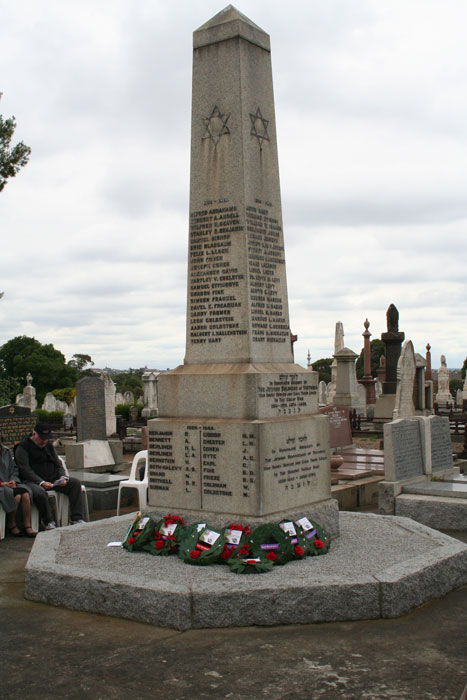 An
announcement was made in the weeks leading up to the
Centenary of ANZAC by Judy Landau, President VAJEX Aust.
She stated that it gave her great delight to announce
that VAJEX Aust (Victorian Association of Jewish Ex
& Servicemen & Women Australia Inc) has
successfully raised the required funds to build a new
Victorian Jewish Memorial after the style of the
historic Memorial located in the Jewish section of the
Melbourne General Cemetery. After an extensive two year
process, Judy has single-handedly sought letters of
support, raised the funds, and obtained approval from
the City of Port Phillip.
An
announcement was made in the weeks leading up to the
Centenary of ANZAC by Judy Landau, President VAJEX Aust.
She stated that it gave her great delight to announce
that VAJEX Aust (Victorian Association of Jewish Ex
& Servicemen & Women Australia Inc) has
successfully raised the required funds to build a new
Victorian Jewish Memorial after the style of the
historic Memorial located in the Jewish section of the
Melbourne General Cemetery. After an extensive two year
process, Judy has single-handedly sought letters of
support, raised the funds, and obtained approval from
the City of Port Phillip.